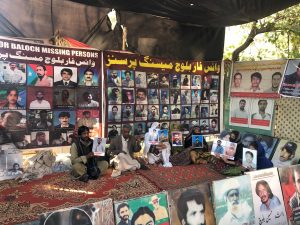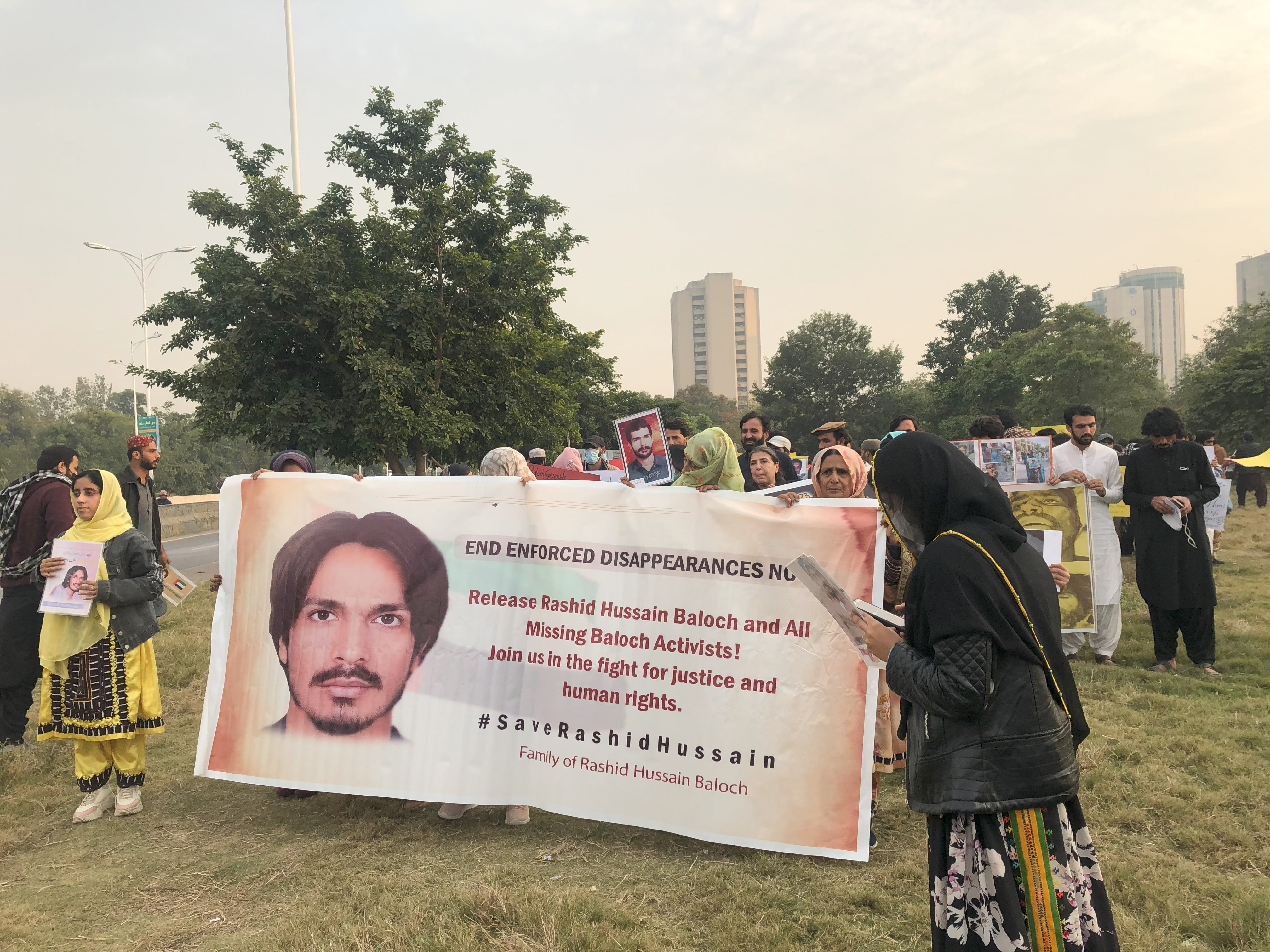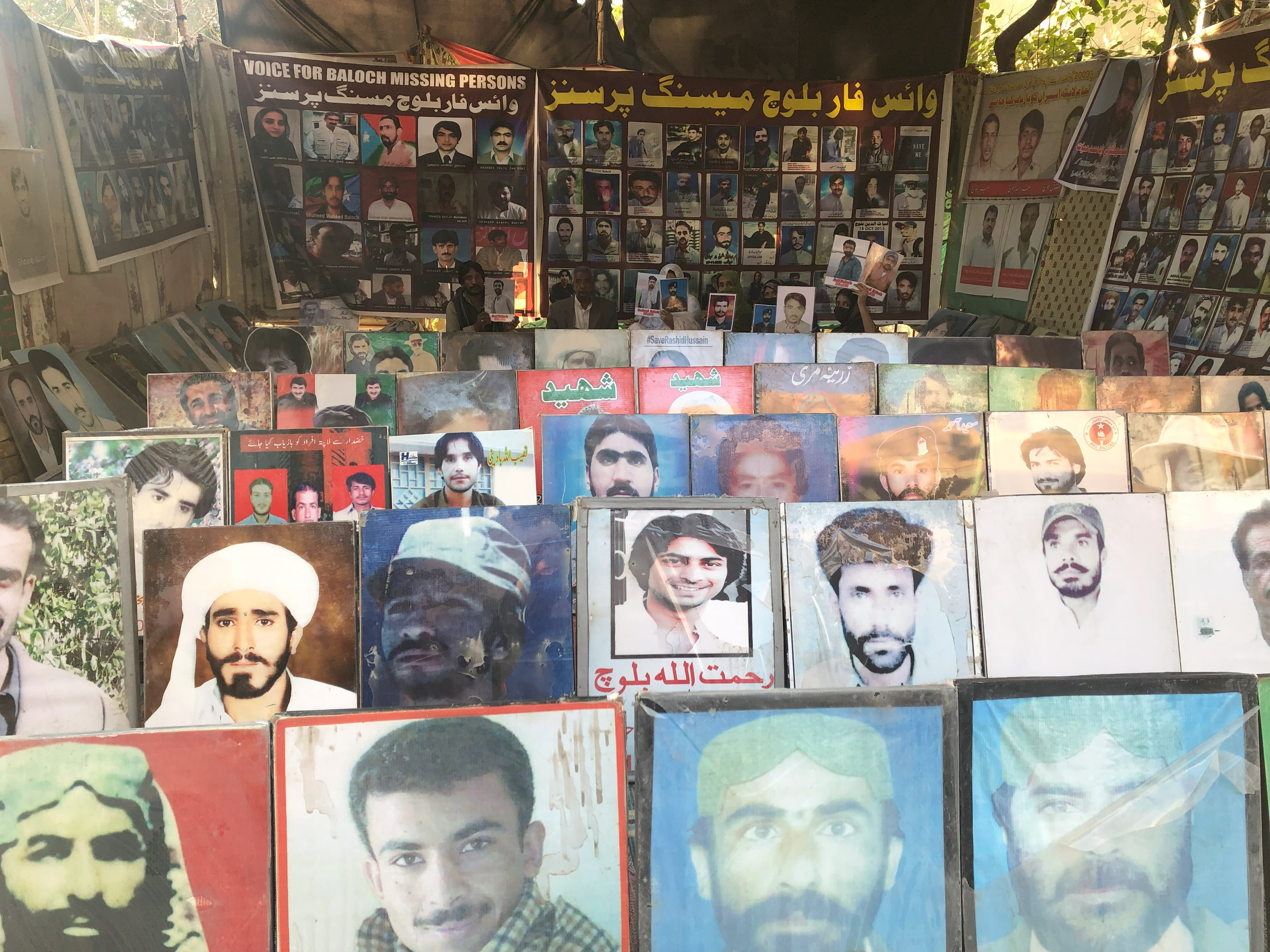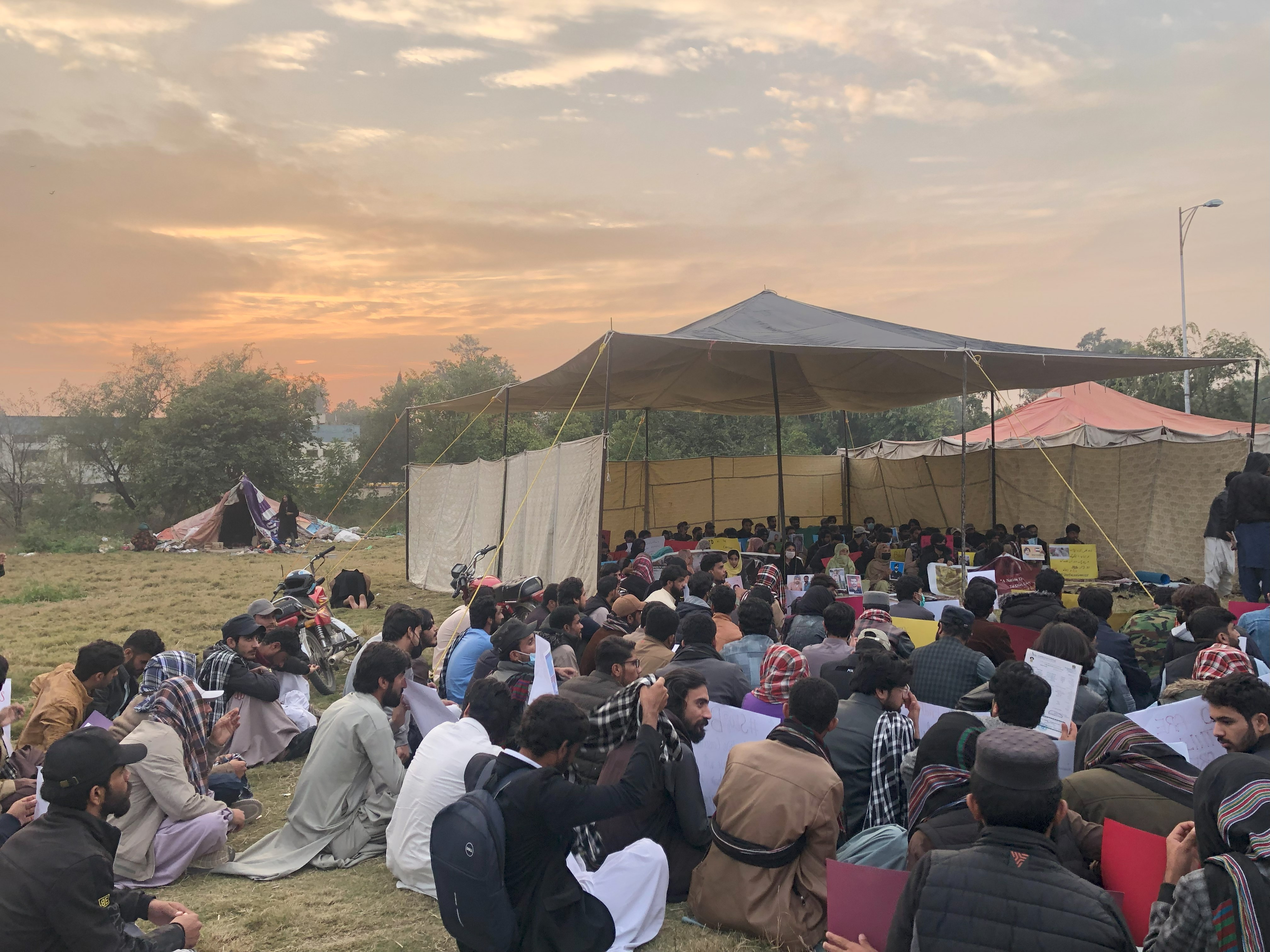Somaiyah Hafeez

Balaach Mola Bakhsh was sleeping at his home when personnel from the Counter Terrorism Department (CTD) took him away on October 29. After 22 days, on November 20, a First Information Report (FIR) was registered against him by the CTD, claiming that Bakhsh had been caught in possession of explosives. He was presented in front of the court where 10 more days of remand were granted. His bail plea was scheduled for November 24.
On November 23, the CTD claimed that four terrorists from “a proscribed group” had been killed in an encounter in Turbat, a city in Balochistan, Pakistan’s largest province. One of the dead was Bakhsh.
His family immediately refuted the official narrative, alleging a staged encounter.
“They took him away from home, and then said we caught him from the mountains with arms,” Balaach Mola Bakhsh’s sister raged on social media. “I want the release of all missing persons. I am burning from the insides, there’s nothing left. Do you think we enjoy sitting outside like this?”
“They took my son and killed him,” lamented his mother. “I brought him up in poverty. I worked as an embroiderer to raise him. He was sleeping next to me. They took him away from me in the darkness of the night. There’s a fire burning in my heart.”
Family members of Bakhsh and other Baloch missing persons staged a protest in Turbat for almost two weeks. A major demand of the sit-in was the filing of a FIR against CTD officials, which was registered after two weeks on December 9. The sit-in resulted in a long march from Turbat to the provincial capital, Quetta, almost 600 kilometers away.

Rally against enforced disappearances in Balochistan.
Protesters are demanding an end to enforced disappearances, the release of all Baloch missing persons, and an inquiry into the alleged fake encounter.
On Sunday, the procession was attacked by the police in Surab.
In Balochistan, enforced disappearances are common, widely believed to be a part of the state’s counterinsurgency operations. Victims of enforced disappearances include political workers, journalists, human rights defenders, and students. Anyone who is merely suspected of sympathizing with the separatists, or of being remotely linked with them, is at risk of being abducted.
The military strongly denies these accusations. “Our hearts beat with [the] families of every missing person. We share their pain,” said Asif Ghafoor, the then-director general of Inter-Services Public Relations, the media wing of the Pakistan armed forces.
According to the Voice for Baloch Missing Persons (VBMP), there are more than 7,000 missing persons from Balochistan. However, the Commission of Inquiry on Enforced Disappearances says there are just 454 active cases from Balochistan as of October 2023.

The VBMP camp in Quetta has been in place for more than a decade now.
Pakistan’s government has failed to take the issue seriously. Recently, the current caretaker prime minister, Anwaar-ul-Haq Kakar, said in an interview to the BBC: “There are only 50 cases of enforced disappearances in Balochistan as per the U.N.’s working group.” Kakar, who is said to be close to the military, has previously suggested that the numbers are “exaggerated.” Sarfaraz Bugti, currently serving as the caretaker interior minister, called it a “small issue.”
Activists refuse to minimize the issue. “There have been many instances of extrajudicial killings of Baloch missing persons, the incident of Balaach being one of them,” Sammi Deen Baloch, a missing persons activist, told The Diplomat from the protest. “The other three who were killed in the fake encounter were also identified as previously missing persons. Missing persons’ families are concerned that their loved ones could, God forbid, also face the same fate.”
She added that the state has been using the policy of extrajudicial killings to weaken and silence the Baloch movement, but the protest in Turbat is in itself turning into a movement.
Sammi is the daughter of Deen Muhammad Baloch, a doctor, who has been missing since 2009.
“This killing of missing persons in fake encounters is just another version of the equally criminal and inhuman ‘kill and dump’ policy of the past. The perpetrators are the same and they suppose that this way their crimes can be given some justification. These abhorrent extrajudicial killings will continue to happen because the judiciary, the parliament, and media tacitly condone it with their criminal silence,” said Mir Muhammad Ali Talpur, a well-known activist who has been associated with the Baloch movement.
“The fear that the state had inculcated in the Baloch nation for decades is now dying at the hand of the state itself. The point has come when rebellion has taken place of the feeling of fear and Turbat’s protest is a huge example of that,” Sammi added.
In 2014, families of Baloch missing persons marched more than 2,000 kilometers from Quetta to the federal capital, Islamabad. Now family members have, once again, traveled to Islamabad to protest. Outside the Islamabad Press Club, families have been staging a sit-in and hunger strike for almost two weeks now in the cold.

Families of missing persons at the sit-in camp outside Islamabad Press Club.
Tales of Anguish
The stories are many, and each one is different, but they all have some common threads. A person – usually a man – goes missing or is abducted. Sometimes he reappears later in state custody; sometimes his lifeless body is found. But often there is never any further trace of the disappeared.
Saira Baloch has been campaigning relentlessly for her brother, Asif Baloch, and her cousin, Rasheed Baloch, for five years now. She has used all legal routes to find her loved ones. Her search has taken her to each and every protest.
On August 31, 2018, her brother and cousin were picked up by the CTD from a picnic point in Nushki, Balochistan. Along with them, eight others were taken. The next day, the CTD released a statement claiming it had arrested “terrorists.” All except three – including Saira’s brother and cousin – were released after a few years, as per Saira.
“Our lives changed, for the worse. I was only 15 at the time and I had never been anywhere else apart from Khuzdar, not even Karachi or Quetta. I would just go to school and come back home – I had no idea about the human rights violations in Pakistan and that enforced disappearances were a common practice,” Saira told The Diplomat. “My studies got completely affected and I quit my education after matriculation. I cannot get an education when I have to be in Quetta one day and Karachi the next to protest and for hearings for the safe release of my brothers.”
The family was threatened to stay silent, warned that “if you raise your voice, Rasheed and Asif will never be released.” When Saira decided to protest on the roads, further threats ensued. Elders in her family were asked, by security officials, “Why does Saira protest? She has defamed us. Why do you allow her to protest?”
“No one wants to be on the road, but we have been forced. If today they release my brothers then I would never go back on the roads,” was Saira’s reply.
“Rasheed’s mother passed away, and instead of saying her last prayer, she kept calling for Rasheed. My mother has been ill for months. We have taken every route, knocked on every door where there was any amount of hope that we might get answers, but no one is even looking toward us.”
Rashid Hussain was reportedly abducted from the United Arab Emirates in 2018, kept in confinement for six months, and extradited to Pakistan in 2019. Yet for five years his mother has been to Karachi, Quetta, and Islamabad with a picture of her son in hands, looking for him. In the camp, for the last two weeks now, Hussain’s mother and sister have been asking a simple question with no answers: “Where is Rashid and why is he being detained without any legal proceedings?”
Jahanzaib Muhammad Hassani worked as a tailor in Quetta. He was abducted from his home on May 3, 2016 infront of his mother Gulseema. The men who took him told Gulseema he was being taken for interrogation for an hour and would be released soon.
“It has been eight years now. Haven’t they asked their questions? His six-months-old daughter is now all grown up. All she has to remember her father is the picture that she holds at these protests,” Gulseema said through tears at a camp established by VBMP in Quetta. “Jahanzaib was my everything – he was my son, my brother, my father – he was my family.”
The camp, which features dozens of photos of victims of forced disappearances, was set up almost 14 years ago by Mama Qadeer, the chairperson of VBMP, whose son Jaleel Reki Baloch was abducted and then found dead in 2013.
“Our entire family is destroyed after Jahanzaib’s abduction. They should take me as well. I am going mad sitting at the camp and going for protests all the time. What was his crime? He was a tailor. I don’t understand what my son did. I don’t know what to do anymore. No one listens to us,” wailed Gulseema.
Bibi Zargul is the mother of Saeed Ahmed, who was whisked away along with his cousin Hafiz Abdullah on August 29, 2013, on their way home from Quetta. Hafiz Abdullah was released after five years, on September 3, 2018, while the whereabouts of Saeed Ahmed remain unknown.
The duo was on their way to Mastung on a motorbike when they were stopped by armed men in three cars. After asking them their names, the men blindfolded them and took them away to an unknown location.
“When we opened our eyes, we found out that we were in a small, high-ceilinged room. They kept us standing. Saeed and I were together for three years and after that I heard nothing about him,” Abdullah said.
Recalling his time in the cell, he said, “I was tied up like a goat. They interrogated us for the first two days and after that I just spent my time in the silence and loneliness of the room I was confined in.”
Six days after Abdullah’s release, Ahmed’s family received a call.
“We were told that Saeed Ahmed has been released and is in a Frontier Corps camp in Mastung. His father frequented the camp but there was no news of him,” recounted Zargul.
Tales From the Dungeons
Even those who return are never the same person; life is altered forever. Bebarg (an alias) was whisked away from his office by members of the CTD. His laptop and mobile phone were taken.
Bebarg never thought that he would be able to see a sunrise again. “I was put into a small room where one didn’t even have room to sleep properly. I was tortured continually for a week. I couldn’t imagine that I would be able to get out. I thought that I would either be killed or be kept forever,” he told The Diplomat via a phone interview.
He was interrogated about his involvement with militant groups, but when he informed the abductors that he knew nothing, they used various tactics to get him to confess.
“Somehow they just want you to confess to a crime you have not committed and they use every measure to do so. One is physically damaged and helpless when in the dungeons. Beating you, not allowing you to sleep, and making you stand for days – these are just some of the tools.”
The psychological impact remains long after being released.
Another victim, who was taken away with his father and brother, told The Diplomat that he could hear the screams of his brother. “I was in their captivity for almost seven months. My brother was charged under false accusations and is still in jail. I got many skin diseases, as I wasn’t allowed to shower for three months.”
Shadaan (an alias) was taken away from his home in Quetta in 2015 at dawn. Armed men barged into the house and asked Shadaan where he had kept the explosives. “I told them I had nothing on me, and they could search the house,” he recalled. Despite searching the house and finding nothing, he was locked in his room and physically abused.
“Then they threw me in the car and took me to an unknown place,” Shadaan said. “They started interrogating me again. I was handcuffed the entire time. They would interrogate, torture, send current through the body.”
The horrifying tales from survivors only add to the bitter pain felt by family members of the disappeared.
“Impossible Pain”
Saeeda Baloch’s brother, Zahoor Ahmed, was abducted on May 31, 2021. He worked as a teacher and was accompanied by another worker at the time of his abduction. The worker told the family that after being asked his name, Zahoor was thrown in a car and whisked away.
A couple of months later, on July 25, 2021, their home was raided at 1 a.m.
“At gunpoint, my nephew Sajjid Ahmed was taken away. Since it happened right in front of my eyes, I wanted to nominate the CTD in the police report, but the officers didn’t allow us to,” said Saeeda.
“My brother was a gold medalist,” she pointed out. “We are told to educate our kids, but if my brother is missing after being a gold medalist then what [is the worth of] education? Which degree or institution will ensure that our kids are not abducted and disappeared?”
She added that the incident has impacted the entire family, who live in a constant turmoil not knowing the whereabouts of their loved ones, or if they are even alive.
“It is impossible for me to narrate the pain we are in, a pain that is constant and endless. Since Zahoor was abducted, my mother doesn’t switch on the fan because she says she has no idea where Zahoor is and if he has a fan to shelter him from the heat. Neither does she switch on the heater during the winter. Can anyone imagine this pain? I don’t think anyone except families with their loved ones missing can.”
Her husband, Faisal Mengal, who worked on the documentation of forced disappearances, was assassinated on December 10, 2011, in Karachi.
On October 4, 2016, Shabir Baloch was abducted by security forces in front of his wife. When his sister, Seema Baloch, left her home in Awaran to travel to Karachi for a protest for the first time, she was crying “madly.”
“I was carrying a pain that I couldn’t put into words. I didn’t know what to do. I came to Karachi to protest and didn’t know what to say. It was the pain that I felt that pushed me to continue protesting for Shabir’s safe release. I told myself that I had to do this no matter what, even if I do not know how to speak or what to say, but I have to get out for Shabir,” recalled Seema. She has been continuously campaigning for the release of her brother, who served as the information secretary of Baloch Student Organization-Azad.
“He would always carry a book with himself everywhere he went. I would say, ‘you carry a book everywhere, I wonder what people will think you’re carrying.’ He’d reply ‘I am carrying a book and not a gun. Books are my companions, if I am not carrying a book, I feel out of place.’”
These tales of anguish are endless and for some they end only to begin again. Mumtaz Baloch was first abducted in 2016 from Khuzdar and kept in captivity for six months. He was once again abducted on November 17, 2017, and remained “missing” for two years and three months.
“When he came back the first time, his eyesight was weak and he seemed weak. He didn’t say much but confirmed that he was taken by the security agency. He was mostly silent for a while after his release,” said Banadi Baloch, Mumtaz’s niece.
The second time when he came back home, he was weaker and had scars on his chest from being beaten with a cane.
On September 6, 2022 Mumtaz was picked up for the third time and remains “missing.”
No comments:
Post a Comment